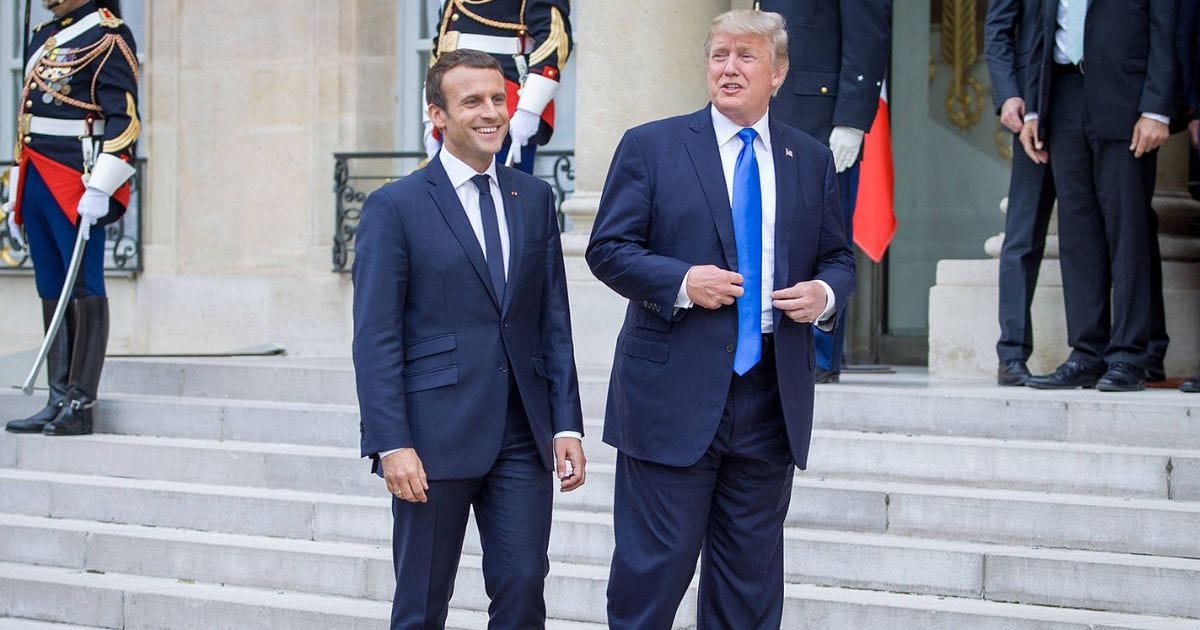Trump’s Personal Deals vs. Macron’s Careful Strategy—Which Will Define Ukraine’s Future?
As the West debates peacekeepers and territorial concessions, two contrasting leadership styles emerge.
The Trump-Macron meeting reveals a profound clash of cultural approaches to international conflicts.
What's Happening
Macron is first European leader to visit since Trump began his second term
Macron say Russia 'is the aggressor' in Ukraine
Trump, Macron agree on concept of European peacekeepers once peace deal agreed
These leaders have fundamentally different ways of handling diplomacy. Trump seeks quick deals through personal relationships. Macron seeks verification and principles through established channels.
This is not just politics – it's a collision between two distinct cultural systems for conducting international relations.
Should peace come through fast deals or carefully built agreements? It all depends on your Cultural Perspective.
Why It Matters
These cultural differences matter because they're reshaping how Western powers respond to the Ukrainian conflict. The outcome could determine how the security of Europe works, unraveling the system the US established decades ago and has kept peace on the continent.
Trump believes he can arrange a quick ceasefire. Macron warns against "an agreement that is weak." These aren't just policy disagreements – they are different cultural approaches to solving international problems.
You can see this cultural gap when Trump confidently says Putin will accept peacekeepers because "I specifically asked him that question." Meanwhile, Macron insists any deal must be "assessed, checked and verified."
Trump's deal-making business culture values quick results and personal connections. Macron's European diplomatic culture emphasizes principles, processes, and long-term stability.
Neither culture is better than the other. They simply reflect different histories and priorities in international relations.
What It Means
Different cultural perspectives create real problems for Western unity on Ukraine.
First, the clash between rule-following and relationship-based cultures in how these leaders approach agreements.
Macron follows a culture where universal principles must guide any peace deal. He clearly states "Russia is the aggressor" and insists on Ukraine's sovereignty.
Trump comes from a culture where deals are tailored to specific people and situations. Rules can bend to get results.
This creates serious tensions when Trump says "we're going to see" about Ukraine possibly giving up territory. At the same time, Macron firmly states Ukraine must keep its sovereignty. These aren't just political differences – they reflect fundamentally different cultural beliefs about whether principles or relationships should guide international dealings.
Second, these leaders have opposing cultural views on controlling events versus adapting to them.
Trump's American business culture believes in controlling outcomes through personal will. He confidently claims he could arrange a ceasefire and even visit Moscow.
Macron's European diplomatic culture recognizes the need to work with complex outside factors. He emphasizes verification and security guarantees rather than personal intervention.
This cultural gap shows when Trump claims Putin will accept peacekeepers because he personally asked him. Meanwhile, Macron carefully notes such forces would only deploy after verified peace. This disconnect threatens Western unity by creating clashing expectations about how peace processes work.
Third, these leaders have completely different cultural approaches to time and process.
Trump's culture seeks to solve one thing quickly through direct action. He wants a ceasefire "as soon as possible."
Macron's culture emphasizes a careful process with multiple connected elements working together. He wants "starting with a truce and then a peace deal" with security guarantees.
This creates practical problems when one side pushes for immediate results while the other insists on thorough verification. Western powers risk working against each other, with some seeking quick fixes while others demand comprehensive solutions.
What's Next
These cultural divides will likely grow stronger as the Ukrainian conflict continues. Western leaders must find ways to bridge their different approaches.
Watch for increasing tension between Trump's deal-focused culture and European leaders' principles-based framework. The upcoming visit by British Prime Minister Starmer shows this isn't just a French concern.
Trump expects to meet Zelenskiy "this week or next" about the minerals deal. This meeting will highlight these cultural differences even more. Ukraine has already partly rejected the deal Trump wants.
The critical question isn't which culture is right, but whether these different approaches can work together. Can they form a united Western strategy, or will they split into competing peace efforts?
Success requires both sides to adapt. Trump's American business culture must recognize that principles and verification matter in diplomacy. European diplomatic culture must acknowledge the value of personal connections and decisive action.
Without addressing these cultural differences, the Western alliance risks facing Putin as divided opponents rather than a unified front. This could undermine the very peace everyone claims to want.





